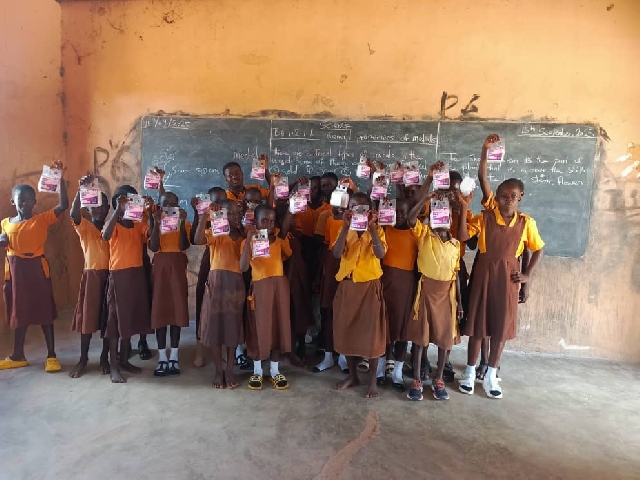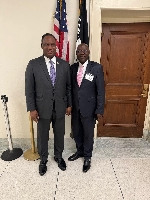Joy returns to Bawku girls as gov't distributes free pads
 Benefiaries of the government free pad programme
Benefiaries of the government free pad programme
Relief and joy have returned to hundreds of girls in the Bawku Municipality who once struggled to balance their education with the challenges of menstrual hygiene.
For years, many adolescent girls missed school during their menstrual cycles due to the lack of financial support from parents and caregivers to provide sanitary products.
Some even dropped out entirely. This painful reality was brought to national attention through the much-acclaimed documentary, “Period Poverty: Girls in Bawku Battle Bullets and Dreams”, produced by journalist Moses Apiah.
The documentary highlighted the struggles of girls who not only faced insecurity due to the Bawku conflict but also endured period poverty that hindered their academic progress.
Following the documentary’s impact, the government, through its free sanitary pad distribution initiative, delivered hundreds of thousands of sanitary products on September 15, 2025, to all public basic schools in the Bawku Municipality.
The intervention is aimed at supporting girls who are in their menstrual period, ensuring that they remain in school without disruption.
Speaking to our reporter, Madam Matilda Abolga, the Municipal Girl-Child Officer, confirmed that the initiative will cover all pupils within the menstrual age range.
She explained that girls from primary four to six, as well as those in junior high schools, will benefit. Plans, she added, are far advanced to extend the distribution to private schools in the area.
“There are about 170 public schools in the Bawku Municipality serving over 27,000 pupils. Every eligible girl will receive the support to make sure no one is left behind,” Madam Abolga assured.
Among the beneficiaries are 13-year-old Gifty and 16-year-old Rita (not their real names), both of whom were featured in the documentary.
They expressed their excitement and gratitude to the government and stakeholders for responding swiftly to their plight. “Now we can focus on learning without fear of missing school during our period,” Gifty said with a smile.
The free sanitary pad initiative is widely seen as a significant step toward promoting gender equality in education, improving menstrual hygiene, and addressing barriers that limit girls’ academic potential in conflict-prone areas like Bawku.
Source: Classfmonline.com/Moses Apiah
Trending News

Flooding on Nsawam–Pokuase highway leaves commuters stranded after heavy rains
04:13
Ghana’s economy expands by 6.3% in second quarter of 2025
19:47
E/R: Akyem Nwinso chief demands development commitments from mining firm
01:24
Gov’t backs local contractors as ‘Big Push’ agenda kicks off — Roads Minister
00:20
GIPC Board Chairman urges youth to uphold excellence, integrity and innovation
12:40
C/R: 73 Youth Employment Agency recruits pass out in Awutu Senya East
01:08
Ghana records 3,000 new cervical cancer cases, 1,700 deaths annually – WHO
00:13
Former Minister Akwasi Oppong-Fosu invited to speak at U.S. Congressional Black Caucus Conference
12:20
Prof. Kwaku Azar criticises court’s denial of bail for Abronye over ‘intemperate speech’
04:06
PWDs in Nkoranza North receive boost for economic empowerment
17:57




